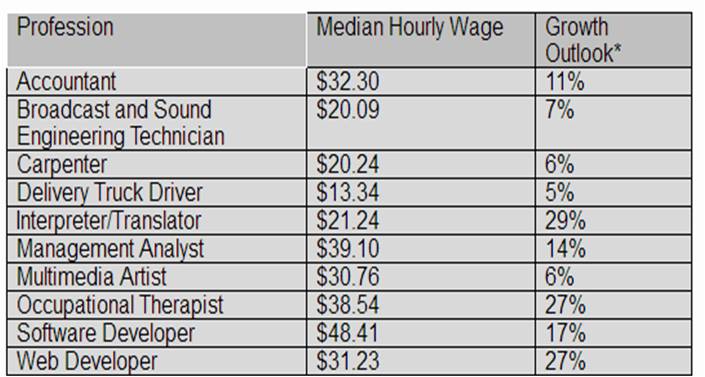Gig Economy: An environment in which temporary positions are common and organizations contract with independent workers for short-term engagements.
 An Intuit study says that the “Gig Economy,” or independent contracting employment in the United States, rose from 12% to 18% in the ten years from 2004 through 2014. The study predicts that 40% of American workers will be independent contractors by 2020.
An Intuit study says that the “Gig Economy,” or independent contracting employment in the United States, rose from 12% to 18% in the ten years from 2004 through 2014. The study predicts that 40% of American workers will be independent contractors by 2020.
TechTarget tells us that the trend toward the gig economy is well underway. And they seem pretty positive about its impact;
“From the perspective of the freelancer, a gig economy can improve work-life balance over what is possible in most jobs. Ideally, the model is powered by independent workers selecting jobs that they’re interested in, rather than one in which people are forced into a position where, unable to attain employment, they pick up whatever temporary gigs they can land.”
Yeah, about that ideal model. Color me skeptical.
My Personal Gig Economy
Granted, I currently participate in the gig economy myself. Although I’m technically retired, I also do contract marketing work and over time have had a variety of clients, mostly in high tech. I love the freedom, the ability to schedule my own time, to be my own boss, and to work from home—all of it.
But, and this is important, I do contract work as a supplement to my retirement income.
That means I don’t have to split my time between working for a client and rustling up new clients, more clients, or better-paying clients. We downsized four years ago so I don’t worry about paying a big mortgage. And we have Medicare so we don’t sweat health insurance and can afford to go to the doctor. We never have to choose between heat and food or food and medication. Sweet.
If I were trying to make a real living doing this, much less raising a family, I’m not sure I’d be so complacent.
Struggling to Make Ends Meet
In fact, I’m pretty sure that it would feel like those science fiction story in which full-time jobs are the purview of the wealthy. All other work exists in the gig economy and everyone struggles to make ends meet except for the entitled One Percent at the top of the pyramid.
Sometimes the ideal situation works and I know many self-employed people who enjoy it. I guess I think it should be a choice not a circumstance that is forced on you. Kyle Kensing, CareerCast’s Online Content Editor, says,
“Freelance and contract work has its advantages: flexibility in scheduling, staying sharp by taking on new projects, and the ability to work remotely might appeal to some professionals.”
 All very true. It also has benefits for employers. The gig economy lets companies, particularly small firms, purchase the skills and services they need without committing resources for a full-time employee they may not be able to afford.
All very true. It also has benefits for employers. The gig economy lets companies, particularly small firms, purchase the skills and services they need without committing resources for a full-time employee they may not be able to afford.
Beware, however, as Beth Robinson warns us in her Above the Law article, “The Truth About the Gig Economy.”
“Being a contractor places you, in many ways, outside of the law that otherwise protects us in everyday life. The reasoning for this seems to be that the employee who should be a contractor, like a business accountant or janitorial service, can simply go and work with a different company.”
The Best Gig Jobs
Should you be one of those who choose the gig economy, know which jobs are the best ones to have. Fortunately, CareerCast has provided us with that list. In their report “CareerCast Identifies the Best Gig Economy Jobs” we learn about the 10 best freelance, part-time and contractual jobs.

*Wages and projected growth outlooks through 2024 are culled from the BLS and reflect averages and projections across part-time, freelance and full-time positions.
Do notice the relatively low pay; none of these jobs is especially lucrative. They pay far less than jobs for Generation Z, for example. It appears that the tradeoff for flexibility and freedom is reduced income—and that’s not counting the lack of benefits like health insurance and matched 401K plans. No do these “10 Best” jobs have big growth outlooks. This may seem like a worthy exchange if you live in your parents’ basement or are retired, less so if you have pressing bills to pay and a family to support.
Making it big in the gig economy may mean cobbling together multiple contracts, renting your spare bedroom on AirBnB, driving for Lyft on weekends, selling your action figure collection on Etsy and working at McDonald’s in your spare time. Don’t worry, you’ll have lots of company.
The proponents make it look like smiling over your laptop at Starbucks when in reality you make work three jobs during the week while Sunday is when you go to your fourth job.
Choose the Right Jobs
As one alternative figure out which jobs are least likely to be automated, replaced with software or artificial intelligence, or taken over by robots. In a sweeping generalization CareerCast’s Mr. Kensing says,
“In this digital age, the workforce is increasing mobile and work can be done from anywhere, resulting in a rise in short-term job opportunities.”
Wait. What? Not all work can be done from “anywhere.” I doubt many hairdressers, masseuses, chefs, nail technicians, maintenance staff, Marine drill sergeants or airline flight crews work from home, just to give a few examples.
 So if part-time, contract or freelance work appeals to you, go for it. Just do it with your eyes open. Gig economy jobs pay less, provide no benefits, offer no stability and force you to keep searching for the next job down the line. You will have small recourse if a client stiffs you or causes you harm. And you will have to arrange and pay for your own healthcare insurance, an increasingly dicey proposition.
So if part-time, contract or freelance work appeals to you, go for it. Just do it with your eyes open. Gig economy jobs pay less, provide no benefits, offer no stability and force you to keep searching for the next job down the line. You will have small recourse if a client stiffs you or causes you harm. And you will have to arrange and pay for your own healthcare insurance, an increasingly dicey proposition.
Life is a tradeoff. Choose what’s most important to you but make sure you make an informed decision.

Your suspicions may have a lot of relevance here, but I’d guess you don’t have much evidence to support your conjecture of “most”.
You voted for Trump, right?
Me?!? I wouldn’t have voted for Trump under any imaginable circumstance.
I was referring to David. My bad…
I did qualify my conjecture with “I suppose…”.
I had a consulting company; it went belly-up as I couldn’t generate enough business. I know, personally, several others who have had the same experience. One was an incredibly capable metallurgist whose services I used several times, but she went out of business. Others’ mileage may vary, and if they make a viable go of it, more power to them!
Yes, I voted for Trump. And, making the assumption you did not, out of respect for Aline’s blog, I’m not going to “get into it” in this venue. (I’ve countered her directly, but IMHO that’s different than two commenters using her venue for an exchange.)
Okay, so my only real point here is that even though your suspicions may have relevance today as I mentioned, without a broader set of verifiable data, your qualified comment of “most’ is only your opinion from a relatively small sample of data. Your opinion could well be completely valid, yet not be indicative of a broader, national trend. That’s all.
If you’ll permit my being persnickety, my opinion is my opinion; being an opinion, it is valid by definition.
However, you are correct, I am operating based on my own personal experience and a small, not-necessarily-random sample.
As you point out, the “gig” economy is a way for companies to get rid of those pesky FT people with those pesky and expensive FT benefits.
Now to be fair, some people WANT to do this. But what I suspect is that, for most people running such companies, it’s a HAVE TO not a CHOOSE TO.
And therein lies the problem. You cannot downsize people en masse, whether from layoffs, offshoring, or automation, thus taking away stability and a solid middle-class life, and expect them to be happy about it. They get doubly-unhappy when all the “beautiful and rich” people, who are now making bonus upon bonus, lecture them about how this is really beneficial, and how you hoi polloi really want it this way…
And one more thing to consider: a mercenary owes allegiance to one thing – their pay. Not your company, not your business, not your mission statement. Knowing that, at any time, their time with you can end, they will have one mental foot already out the door seeking their next gig. That means they’re not focused on YOUR gig.